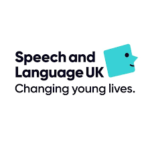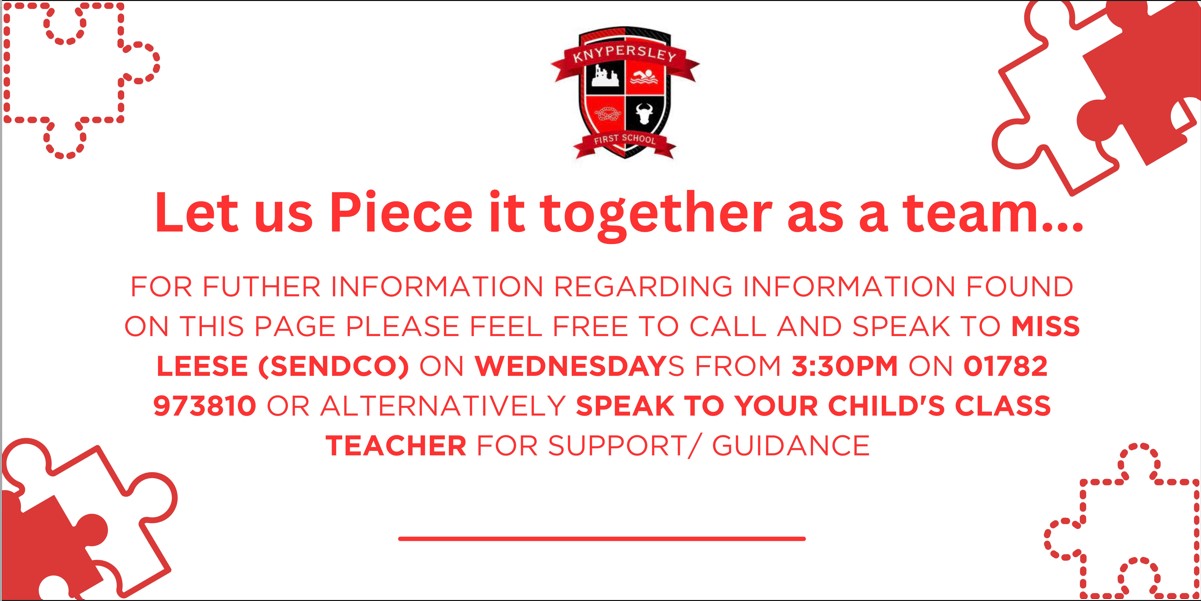Speech, Language and Communication
At Knypersley First School we recognise the importance of Speech, Language and Communication as an essential skill for learning and building friendships. However, around 10% of children actually start school with a speech, language or communication difficulty, which if not identified early enough, can have a detrimental effect on future achievement. Lack of intervention can especially impact on phonics and literacy development, but often also leads to long term difficulties with employ ability and wellbeing.
How can you support your child at home?
Giving your child the best start with speech, language and communication development should above all, be fun! Face to face interaction with another human being is essential for a child to develop listening skills, the ability to take turns, to understand facial expressions, and to understand gesture and intonation are all essential for their future learning success. Screen time has its value too, but to support your child's progress nothing beats the time you can give to talk and share stories with your child.
Here are just a few ideas to support early language development:
Ditch the dummy! - Try to encourage removal of dummies and bottles by the age of one as this can really impact on the child's ability to produce different sounds. Speech can become very unclear and may require therapy to help correct.
Sound Awareness - your child to recognise different sounds will really help when they come to recognising phonics. Play games or read books that require you to make different animal or vehicle sounds for them to recognise. Play Ispy games whilst you are in the car or out and about. Ask them "Can you see something beginning with the /t/ sound?" Have a sound hunt around the house. Tell the child to "find me 5 things that begin with a /b/ sound."
Rhymes and Songs - Sing as many rhymes and songs as you can as this really helps with recognising sound patterns and allows them to listen carefully to the beginnings and ends of words.
Clap syllables - Clap out the syllables in words to help identify different sounds. Don-Key = two claps
Reading - Schools are always trying to encourage children to do more reading. It really is essential to share stories and books as soon as you can, a child is never too young to have you read to them or talk about pictures! Don't be worried if you are not a confident reader yourself, making up your own stories is just as good. This helps them to hear more words so increases their vocabulary, it also provides you with opportunities to ask questions about the story to help build understanding.
Ask WH questions - Ask WH questions like who, what doing, what, where, when and why are vital for both receptive and expressive language skills. Having a sound understanding of language will really help when it comes to writing and reading.
Games - Role play or games, provide endless opportunities for shared engagement to help develop listening and turn taking skills, all essential for learning and progression. You don't need to invest in expensive games, a simple Teddy Bears picnic, or tractors in the sand pit are great activities and again give you that face to face interaction that your child needs to support their speech and language development. Having word challenges is a fun way to build up understanding of word categories and extend vocabulary. 'Name five things' can be played anywhere. Give them a category, for example 'Farm animals' and see who can name five farm animals the fastest. Make the categories harder for older children.
Modelling - Always try to use a nice clear voice when speaking to your child. Model back phrases or words that they don't quite say correctly. Never ask them to repeat things 'properly', simply modelling it correctly will help, or maybe just clarifying "Did you mean....".
Gesture or visuals - Using gesture, such as pointing to an object that you are naming or miming an action can really help support understanding. Some children may also benefit from symbol or picture visuals to support understanding.
Don't forget all children develop at different rates, but if you have any concerns regarding your child's speech, language or communication development, please do speak to their class teacher.
Speech and Language UK is a charity based support that offers a range of ideas to support speech development. There is also on their webpage a speech development overview in-line with age related milestones. Please click on the below icon and you will be then able to access the range of resources available via Speech and Language UK.

Makaton Sign of the Week
Makaton Sign of the Week
Within our community there are increasing communication difficulties which means that many of our children are finding verbal communication a challenge. Therefore we strive to be a ‘Communication friendly’ school to ensure the highest possible chance for progress for all children including non-verbal pupils.
We will be introducing Makaton as a whole school communication strategy, after all, there is no point in teaching Makaton to the child who needs communication support, if they still have nobody to communicate with! For this reason, we will be recording a ‘Sign of the week’ which will be modelled by members off staff across the Children First Learning Partnership, which will be shared on our weekly newsletter and within our Learning for Life assemblies on a Monday morning. We invite you to learn alongside your child so that we can be even more inclusive not just within school but within our local community. Learning these signs together can really help raise awareness of communication difficulties and promote inclusivity.
Makaton Sign of the Week:
WB 26/04/2024 Finished
WB 15.4.2024
WB: 8.4.2024 Makaton -
WB 18.3.2024
WB 11.3.2024
WB 4.3.2024 -


